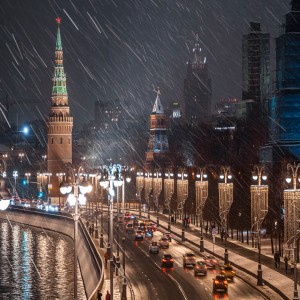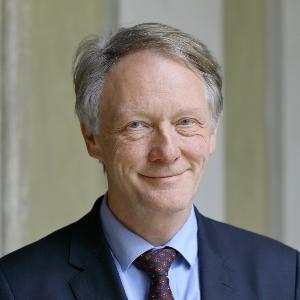Interview about the Ukraine crisis: A dangerous view of history
16 Feb 2022
Historian and Eastern Europe expert Martin Schulze Wessel explains what it is that makes the Ukraine crisis so explosive right now.
16 Feb 2022
Historian and Eastern Europe expert Martin Schulze Wessel explains what it is that makes the Ukraine crisis so explosive right now.

Moscow Kremlin | © IMAGO / Russian Look / Konstantin Kokoshkin
The eyes of the world are fixed – with tension and concern – on Ukraine and the build-up of Russian troops there. Historian Professor Martin Schulze Wessel, holder of the Chair of History of Eastern Europe and Southeastern Europe at LMU and currently a Visiting Fellow at St. Antony’s College in Oxford, talks in an interview about the historical context of the current crisis, about what Putin’s goals might be, and about historical analogies to Nord Stream 2.
Professor Schulze Wessel, what do we need to know about Russo-German history to understand the role of Germany in the Ukraine crisis?
Martin Schulze Wessel: History reveals a special and multi-faceted relationship between Germany and Russia. From the 18th century onward, a close political alliance sought to control the countries that lay between Prussia and Russia, in particular Poland. After the First World War, the Treaty of Rapallo carried on where this alliance left off, leading in 1939 to another partitioning of Poland.
Yet relations between Germany and Russia cannot be reduced to this political aspect alone. In the 19th century, intensive cultural dialogue deepened the relationship: German philosophy, especially its idealism, was exceptionally well received in Russia, while Germany was very receptive to Russian literature.
Do the two countries share a long history on energy policy, too?
Russia was always a major exporter of raw materials, a fact linked to the growing political power of the Tsarist empire in the 18th century. Peter the Great had an interest not only in selling timber and other commodities, but in dominating supply channels, swelling fiscal receipts in state coffers and thereby augmenting the power of his empire. Russia thus had an interest in dominating Baltic trade – hence the contact with Schwerin (capital of the Duchy of Mecklenburg) back in the early 18th century to protect trade routes by means of alliances with German territorial states. The objective was to develop Russia’s foreign trade, which also led to new canal links to the North Sea with no customs-related interruptions. The canals planned at this time were infrastructure projects with significant implications for international politics, so it is fair to draw an analogy to the Nord Stream 2 pipeline today.
Putin’s recent statements reflect a tendency to place his political actions in historical contexts, with the Russian Tsarist empire playing a far greater role than the former Soviet Union.Martin Schulze Wessel
Against the backdrop of history, where do you see Russia’s interests in the Ukraine crisis?
Putin’s recent statements reflect a tendency to place his political actions in historical contexts, with the Russian Tsarist empire playing a far greater role than the former Soviet Union. In addition, Putin formulates what he terms ‘sacred’ goals, which he also did regarding the conquest of Crimea in 2014.
One thing I fear is that the conflict may not follow political rationale alone – which would be bad enough – but may also be linked to a historic mission. In a history essay that Putin published last year, for example, he concluded that the Russians and Ukrainians constitute a single nation. He thus cast doubt on the nationhood of Ukraine. Based on this – inacceptable and incorrect – reading of history, he might attempt to legitimate annexations. Putin might in fact be caught in an understanding of history in which he sees a putative war against Ukraine as an internal affair. History could serve as the legitimation for waging war – and make the course of the conflict very difficult to predict.
In the influential German business daily Handelsblatt, Ursula von der Leyen spoke of a “deployment of Russian troops around Ukraine that has not been seen for 70 years”. To what extent can we compare Russia’s present behavior with historical events?
The President of the European Commission’s allusion to the Second World War is factually correct, yes: During the Cold War, the only time we saw a similar accumulation of troops in Europe was for the invasion of Czechoslovakia in the Prague Spring of 1968. However, her link is not enlightening because the Second World War was a completely different event to what is happening now.
Putin failed in his goal of dividing the Europeans.Martin Schulze Wessel
Germany has been accused of hesitancy in its attitude toward the Ukraine crisis. Rightly so?
Indeed, the public diplomacy of the new German govermment sounded rather ambivalent at the beginning. However, I think that, after 2014, Germany went a long way toward containing Russia with sanctions that Putin certainly did not expect. Putin failed in his goal of dividing the Europeans. There is no doubt that, if an invasion does indeed materialize, Germany will give its backing to far more extensive sanctions than in the wake of 2014. Given its economic interdependencies with Russia, Germany will have a heavy burden to bear, of which Nord Stream 2 would only be one element.
Can Germany’s policy toward Russia today build on Willy Brandt’s policy of détente?
The policy of détente under Willy Brandt was highly successful, but it is not a recipe for the present day. Circumstances have changed fundamentally. We are no longer dealing with a status quo power such as the Soviet Union, which did not want the territorial situation in Europe to change after Stalin: We are now facing a power that seems to be interested in the status quo ante as it existed before NATO’s eastward expansion. Putin’s Russia is a revisionist power that we cannot encounter with détente, but with a mix of containment and cooperation in international formats. That is what makes today’s situation so different from the 1970s – and so dangerous.

Prof. Martin Schulze Wessel | © Historisches Kolleg/Stefan Obermeier,Muenchen
You yourself studied in Moscow and later founded the Deutsch-Ukrainische Historikerkommission (German-Ukrainian Historical Commission). How do your colleagues in Eastern Europe see the situation?
Just this week I spoke with my Ukrainian Co-President of the Historical Commission – which, incidentally, was founded after Russia annexed Crimea in 2014 partly to ensure that colleagues in Ukraine were not left alone in this situation. Instead, the aim was to establish institutional and personal, collegial links between Germany and Ukraine.
My colleague told me that his compatriots are more relaxed about the current conflict than people abroad might imagine. Why? Because a state of war with Russia has – sadly – been the norm for years and has so far run up a death toll of around 14,000. It is almost as if people get used to it. That said, this war could spread hugely if the current situation escalates.
Interview: Anja Burkel
Professor Martin Schulze Wessel has held the Chair of History of Eastern Europe and Southeastern Europe at LMU since 2003. Focal areas of his research include the history of empires in Eastern Europe, Russian historiography and historical consciousness, transnational relations between Eastern, Central and Western Europe, and the religious history of East-Central and Eastern Europe. Until summer 2022, Schulze Wessel is conducting research under a Richard von Weizsäcker Fellowship at St. Antony's College, Oxford.